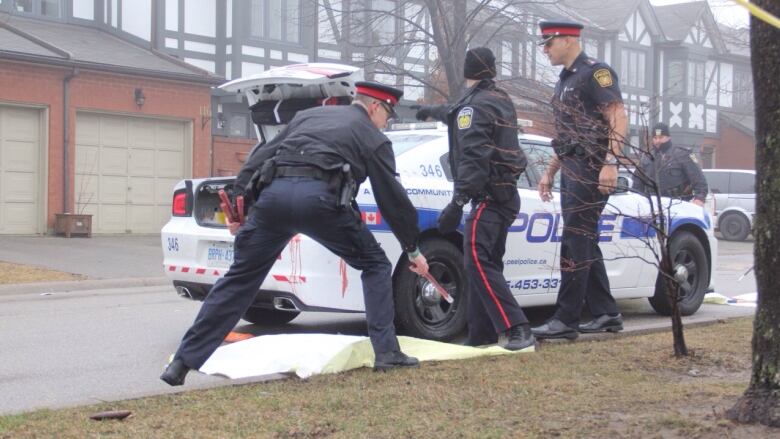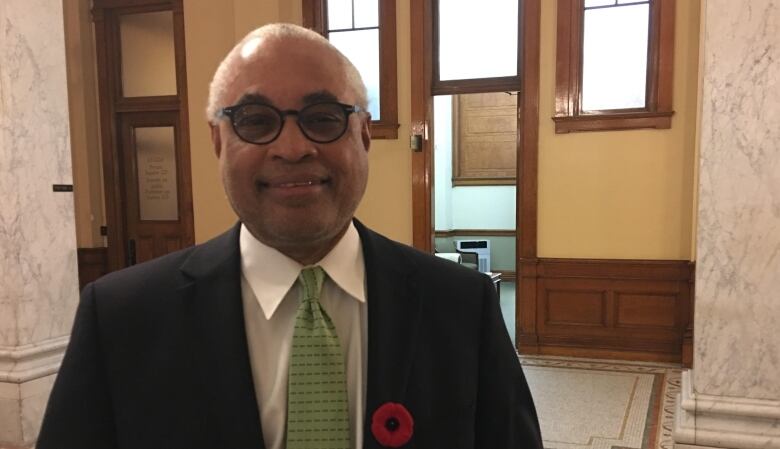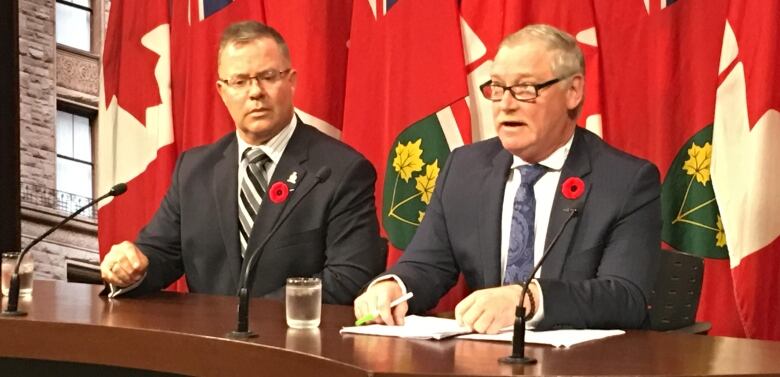Ontario's sweeping police reforms called 'historic,' but officers' unions pushing back
With proposed changes aiming to rein in policing costs, unions representing officers warn of 'privatization'

It's the mostsignificant reform to policing in Ontario a generation, according to the Wynne government, and it's being greeted largely with cheers from those wanting more police accountability but with alarm from the unions representing officers.
A sweeping bill, introduced in the Legislature on Thursday, would tighten independent oversight of police, expand the mandate of the agency that investigates when officers kill or injure someone, and give municipalities more power to hand non-core policingduties to civilians.
- Ontario moves to strengthenoversight of police, redefineofficers' duties
- Policing in Ontario facesits biggest changes in 27 years
The bill would also give police chiefs the ability to suspend officers without pay when charged with a serious offence, as Ontario is the only province where that option is not currently available.
"I think today is a historicday," said Julian Falconer, a prominent Toronto lawyer who specializes in civil liberties cases.
"As a broad, sweeping first step, it's important," Falconer told reporters at the Legislature on Tuesday. Hesaid the bill"changes the landscape of police oversight."

The bill, called the Safer Ontario Act, is the first comprehensive reform in 27 years to the laws governing policing in the province.
"It's a good day for policing in North America, because all eyes will be on Ontario to see how this is implemented," saidKingsley Gilliam, communications director for the Black Action Defence Committee
The bill would give the job of probing all public complaints against police officers to an independent agency, so that the police forces are not investigating themselves.
Currently, only the most serious complaints, such as corruption, discreditable conduct, and unlawful use of police powers, are investigated by this office. All other complaints are handled by police forces thmselves.
"I am pleased with the fact that a civilian organization will carry out 100 per cent of the investigations, as opposed to the 15 per cent that I`m doing now," saidGerryMcNeilly, the current Independent PoliceReview Director, which is to berenamed the Ontario Police Complaints Agency.
Also, the Special Investigations Unit gets expanded powers. It currently investigates deaths, serious injuries and sexual assault allegations involving police. Among other things, the changes would bring in the SIU whenever an officer shoots at a person.
In a written statement released Thursday afternoon, SIU DirectorTony Loparco said the unit "wholeheartedly welcomeshaving independent legislation, a recommendation that has been made by our organization numerous times over the years.
"Not only will updated and separate legislation provide the Unit with the ability to conduct more rigorous and independent investigations, it will also allow for more transparency and accountability for policing and oversight as a whole," the statement reads.
"As well, new legislation will increase the SIU's ability to adapt more quickly to circumstances as they change."
Police unions sound alarm
The unions representing officers are sounding the alarm over the bill because they say it opens the door to privatizingduties currently done byofficers.
"Privatizing policing is not in the interest of the public," said Bruce Chapman.president of the Police Association of Ontario, theprovincial umbrella group of police unions, during a news conference at Queen's Park.

The bill spells out which duties must be performed by police officers, allowing municipalities to hand other tasks, such as directing traffic, to lower-paid civilians.
That power "will be invaluable in our modernization work, as we look to share responsibilities with other community partners who should more appropriately perform some of the duties currently being carried out by police officers," saidChin Lee, acting chair of theToronto Police Services Board, in a statement.
Ontario policing costs 'highest in Canada'
"We can't let community policing decisions be made by politicians who focus solely on budget reduction rather than keeping our neighbourhoods safe," saidMike McCormack, president of the TorontoPolice Association, in a statement.
"No, we are not looking at privatizing police services, I want to make that very clear," said Marie-FranceLalonde, the minister of Community Safety and Correctional Services, during a news conference. "Having said that, is our highly trained police officer the best person to be on a construction site [directing traffic]?"
Lalondeinsists the billwill help municipalities rein in thecost of policing by, for instance,allowing forces topartner with community and mentalhealthagencies to prevent people from being repeatedlycaught up in the justice system.
Ontariopays moreper-capita for policing than anyotherprovince, with thecostsgrowing at three times the rate of inflation since 2002, according to figures from the Association of Municipalities of Ontario.
The reforms would put in place nearly all of the recommendationsmade earlier this year in Appeal Court Justice Michael Tulloch's report on police oversight.












_(720p).jpg)


 OFFICIAL HD MUSIC VIDEO.jpg)
.jpg)



























































































